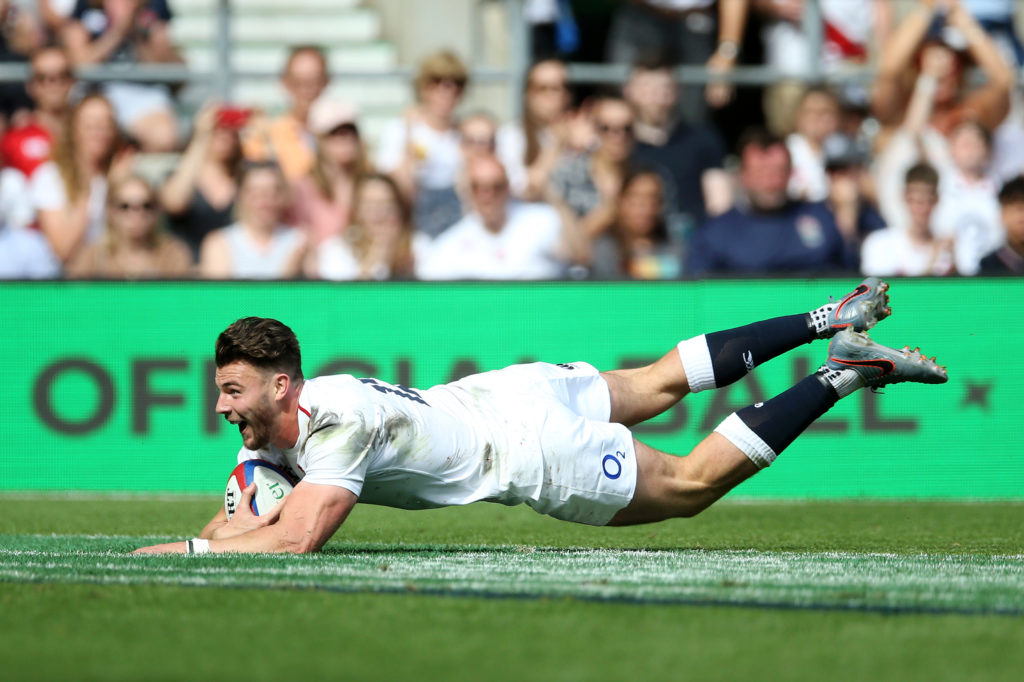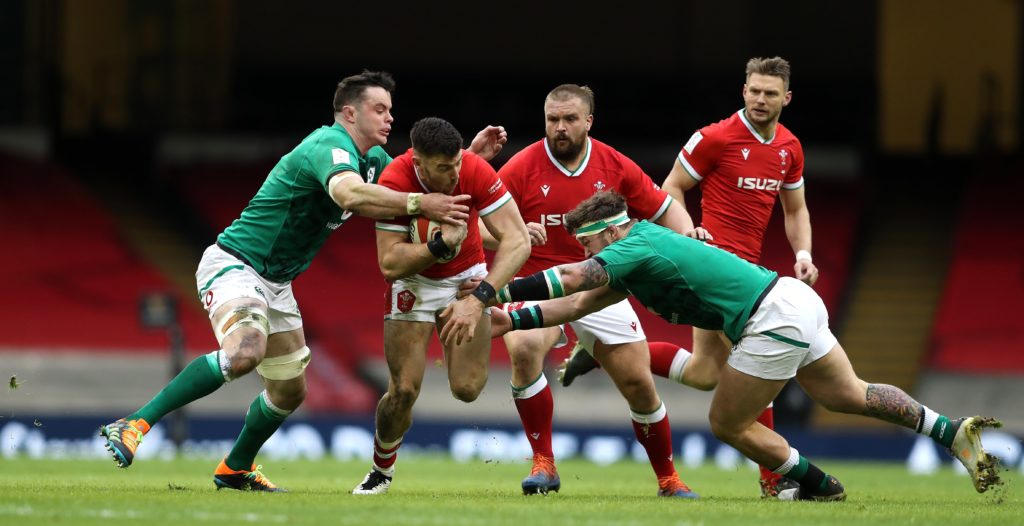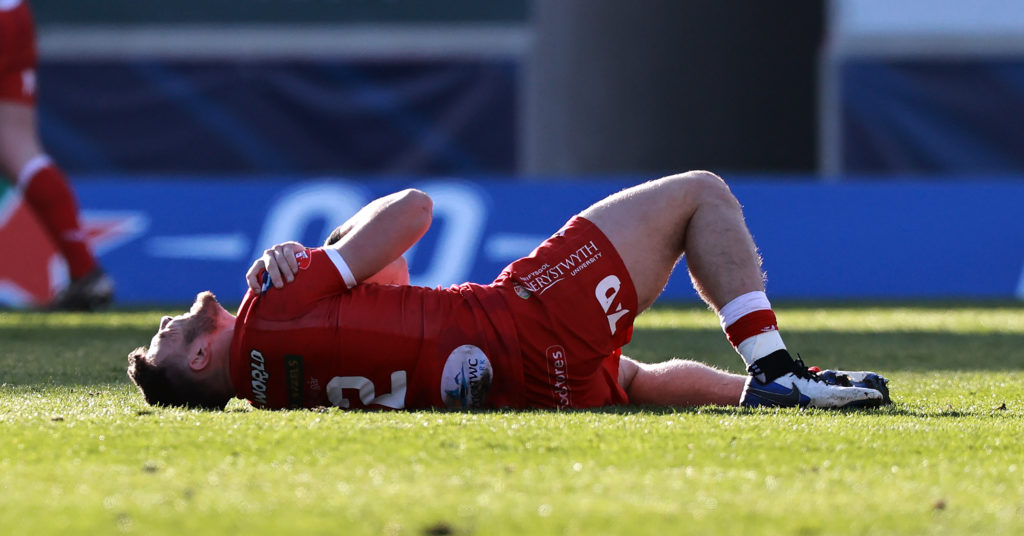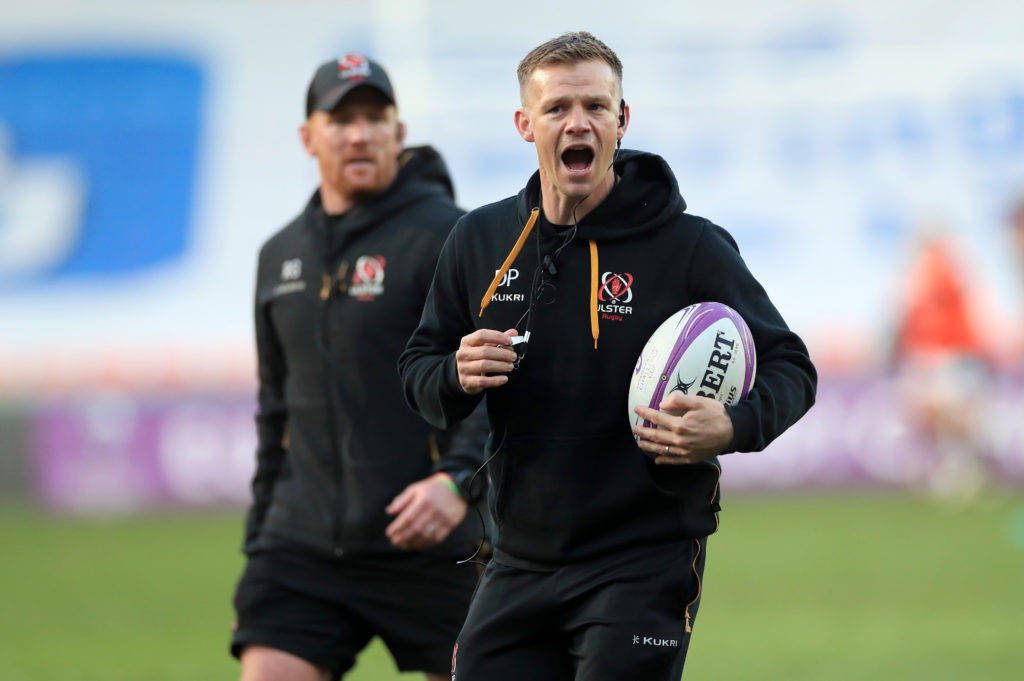When Johnny Williams ran into the swirling wind and rain of Parc y Scarlets to make his Wales debut last November, it was the realisation of a lifelong dream. The previous 17 months, by way of contrast, had been a gradually unfolding nightmare.
Back in June of 2019, shortly after representing England in a non-capped international against the Barbarians, the powerful, dynamic centre was blindsided by a cancer diagnosis and endured a debilitating four-week course of chemotherapy. His World Cup ambitions crumbled to dust and he was forced to watch the tournament from his hospital bed.
After making a swift recovery, he made a heralded comeback for his club Newcastle before the Covid-19 pandemic swept across the UK. Not long afterwards, all forms of rugby were suspended and the sport itself was pushed to the cliff edge of financial oblivion as revenue streams dried up alarmingly.
As a result of all the uncertainty and belt-tightening, Williams found himself out of contract. His career path – so meticulously mapped out until then – suddenly appeared bound for a dead end. In eight months, he had gone from running out at a packed Twickenham to being locked down in his Reading home, genuinely fearing that his rugby career had been prematurely snuffed out.
I thought clubs would think, ‘He’s the one who had testicular cancer’. I thought they’d have doubts about signing me because they’d assume I had health issues and that sort of stuff.
Johnny Williams
“I’m not going to lie,” he says, thinking back ruefully. “It was a very scary, very stressful time. Covid hit and most clubs put a hold on recruitment. I felt like I had a hell of a lot on my plate.
“It’s hard enough going through cancer treatment when you’ve got the security of having a job, but then being out of contract made it all seem even bleaker. I tried not to worry too much about the contract situation until the dust had settled and I was almost back fit, but it was always there at the back of my mind.”
Lockdown engendered a pessimistic mindset, and Williams convinced himself the illness would taint people’s perceptions of him.
“I thought clubs would think, ‘He’s the one who had testicular cancer’,” he admits. “I thought they’d have doubts about signing me because they’d assume I had health issues and that sort of stuff.”
It was for that reason Williams was initially reluctant to go public. After a while, though, people started asking questions about his prolonged absence and he realised that “there are bigger things than rugby”. An Instagram post revealing the diagnosis provoked an outpouring of public sympathy that helped him navigate the uncharted territory in which he had found himself stranded. An appearance on the BBC’s You, Me and The Big C podcast helped him put things in perspective, giving him a platform to encourage other young men to check themselves.

“No doctor or nurse is going to laugh you out of their surgery, even if it turns out there’s nothing to be worried about,” he says.
While admitting he went through some “dark times”, Williams is immensely grateful to have made a full recovery.
“With most cancers,” he says, “it’s a question of life or death. It’s not a very PC thing to say but if there’s a cancer to have, it’s testicular cancer, because the rate of recovery is so much higher.”
Such life-changing events can cause wider ripples. Whether by coincidence or not, Williams’ life took a distinct turn once the cancer had gone into remission. The Weston-Super-Mare-born, Reading-raised England Junior World Cup winner reset his compass to point west, eventually crossing the Severn Bridge to the land of his father. On the surface, his story is a typical example of the more fluid notions of nationality we’ve come to experience in a shrinking, increasingly connected world. Speak to him, though, and it becomes apparent there was only ever one real choice. This is no opportunist switch of allegiance.
“My hero growing up was Super Gav,” he reveals with a grin, making reference to Welsh rugby’s Noughties poster boy, Gavin Henson. “I was at the All Blacks game in 2004 where we lost by a point, I was at the England game the following year when he slotted that kick to win 11-9. I’d have been nine years old at the time, and I was going absolutely nuts when that kick went over, jumping up and down in my daffodil hat.
“The whole reason I wanted to play rugby was going to the Principality Stadium with my dad, sitting among 75,000 other people, getting swept up in the hype around the game, the intensity of it. I just wanted to be on the pitch. I supported Wales wholeheartedly. I couldn’t not, because my dad’s a mad Taff! I was four when I went to my first game and we’d go to three or four internationals every year. He’s so proudly Welsh and so patriotic. That was infectious for me as a young boy.”
My old man always wanted me to play for Wales and was so incredibly proud when I got called up to Wales Under-16s. A year later, when I got picked for England Under-17s, the difference in his pride was night and day!
Johnny Williams
Much is made of Williams’ history wearing the red rose, in that Junior World Cup triumph in 2014 and with the senior side against the Barbarians, but he is quick to point out the first international jersey he donned was a Welsh one.
“No one knows this, but I played Wales Under-16s first. I didn’t make England South West Under-16s or Wales 16s originally, but got a Welsh call-up due to an injury. I then didn’t get a call-up to Wales Under-18s and because I was at London Irish and playing well, the next natural step was to play England Under-17s. That was the right thing for my development and it got me in the pathway. Wales didn’t have an Under-17s side, so there was no alternative if I wanted some international age-grade experience.”
While it made sense to accept such an invitation, Williams’ Welsh-speaking father’s pride was somewhat qualified when his son received his summons to England.
“My old man always wanted me to play for Wales and was so incredibly proud when I got called up to Wales U16s,” Williams says with a broad grin. “A year later, when I got picked for England U17s, the difference in his pride was night and day!”
If it isn’t already clear where the Williams family loyalties lie, a glance at Johnny’s passport should clarify matters. His full name is John Bleddyn Rhys Williams or, to use his father’s preferred abbreviation, ‘JBR Williams’.
“My Dad’s rugby hero was JPR. My parents desperately wanted me to be a JPR Williams, but they couldn’t come up with a good middle name beginning with P. I think Percy might have been an option, but they eventually went with Bleddyn, and I became JBR Williams.”
Given the position he’s ended up playing, being named after Wales’ “prince of centres” Bleddyn Williams has more than an air of self-fulfilling prophecy.

Williams’ return to rugby in January of 2020 was curtailed by the pandemic and the first national lockdown and it was during this enforced period of isolation that he began considering his options. It seemed like a natural time to grasp the nettle. Sourcing Wales coach Wayne Pivac’s contact details, he took the bold decision to call him up and introduce himself.
“Looking back, I guess it was a pretty ballsy move on my part, but I wanted to find out what he thought of me. I’m not sure he knew who I was but we had a good chat, and I told him of my ambitions,” says Williams.
Unlike some interpretations, Williams’ path to the Wales set-up wasn’t remotely pre-ordained.
“He didn’t make me any guarantees. He certainly never said, ‘Come to Wales and I’ll pick you for Wales’. It was completely up to me to make the commitment, and prove my worth,” he adds.
Williams had kept in touch with his old coaches from London Irish, Glenn Delaney and Richard Whiffin, both of whom had moved to the Scarlets. When Hadleigh Parkes announced his departure for Japan, a vacancy arose in the side’s midfield. Williams was only too happy to fill it.
“Covid had hit and the Premiership teams had put a hold on recruitment. I didn’t think anyone wanted me but the Scarlets were interested, so I decided to make the move, commit to them and try to make an impression.
“Wayne now knew who I was because of that phone call, so it had been worth it for that alone. It got me on his radar. He knew I had ambitions to play for Wales, and thankfully I played well enough in those first few games (for the Scarlets) to get picked. If Glax (Delaney) hadn’t been there, they might not have taken a punt on me and who knows what would have happened.”
We’d been talking about pay cuts, asking whether rugby was financially stable, and I was wondering whether I had a future in the game anymore. Not even a year down the line, I was a Welsh international.
Johnny Williams
What happened was the perfect antidote to what Williams had endured over the previous eight months. By the end of the autumn, he’d been capped twice, scored a try against England and impressed enough for Sam Warburton to start purring about him as contender for the British & Irish Lions squad to tour South Africa.
“Coming from him, having watched him play when I was coming through, was really flattering,” Williams says. “It was the boost I needed at the time. You have doubts that you’re ever ready to play international rugby, and I had those doubts.
“As soon as I had my first cap, I knew I was ready and that was my level. The natural next step that year was the Lions. It wasn’t to be, but when you compare and contrast (with what had happened before), it’s insane. We’d been talking about pay cuts, asking whether rugby was financially stable, and I was wondering whether I had a future in the game anymore. Not even a year down the line, I was a Welsh international.”
Williams’ star was clearly in the ascendancy, and he was picked to start Wales’ Six Nations opener against Ireland. A head injury forced him off before half-time, and he was still undergoing return-to-play protocols when the Scotland fixture rolled around six days later. He was one of several midfield players unavailable, joining Jonathan Davies and George North on the treatment table while Wales snuck a second victory. Two weeks later, they were preparing for a tournament-defining fixture against England.
“The England game gave Wayne a massive selection headache and the boys genuinely didn’t know what the team was going to be. Ultimately, there were a lot of disappointed players, myself included.
“He went with Foxy (Davies) at No12. He’s a class player, a good leader and is more experienced than me, so I can’t blame him for that, but it was quite tough being the starting 12 in that first game and then not featuring for the rest of the campaign. The ‘bin juice’ (non-selected players) helped prepare the first team really well for that game and that was a key part of our success. We trained our absolute best that week and almost ripped the (starting) boys apart. We prepared them so well and they ended up putting 40 points on England.”
 Sale Sharks” class=”wp-image-19719″ />
Sale Sharks” class=”wp-image-19719″ />The emphatic victory worked against Williams, as Pivac was loath to tinker with a successful side. By the end of the tournament, when Wales were crowned champions, Williams was left with what he describes as a “bittersweet” feeling. He was a member of the victorious squad, but he felt a little on the periphery having only featured for 25 minutes.
It means the autumn internationals in which Wales face New Zealand, South Africa, Fiji and Australia are, in his words, “a huge carrot”.
“It would be an absolute dream to face the haka,” he continues. “And it will be a real marker for us to see where we’re at. We’re playing the best teams in the world, and there’ll be no easy games. The boys in at the last World Cup were saying Fiji was the toughest game they played, so all four will be massive Tests.”
Before then, though, Williams is concentrating on resurrecting his career with the Scarlets. His season was cut frustratingly short back in April when he dislocated his shoulder during a humbling defeat by Sale in the Champions Cup. He winces when he describes the scene in the medical room as being “like something from the exorcist”. Five people were twisting, pushing and leaning against his shoulder in a vain attempt to shunt it back into its socket. The pain was excruciating, and he was paranoid he’d been misdiagnosed. A friend had recently broken his shoulder, and suffered extra damage when the medics tried to force it back into place, mistakenly thinking it was a dislocation. In Williams’ case, an ambulance was eventually called and, after a double dose of morphine and copious volumes of gas and air, the shoulder was returned to its rightful position.
After surgery and months of intensive rehab to repair the nerve damage, Williams is edging tentatively back to fitness. He’s back in full training, “doing all the running, and all the cardio stuff, just minus the contact”. That will hopefully follow soon, and he can stake a claim once again to that No12 jersey among an increasingly competitive field. Davies has just been announced as club captain, and experienced international Scott Williams has returned to the club after two years with arch-rivals Ospreys.
“It’s the right thing to say you never want to be comfortable in your shirt, but I’ll be honest: it’s lovely when you know it’s your shirt,” says Williams.
Competition, though, as the adage goes, raises everyone’s standards.
Peely has a different philosophy to Glax. With Glax, it was a more relaxed scenario, almost like a freedom. With Peely, it’s all about driving the highest standards in training every day. If there’s a dropped ball or bad pass, you’ll be picked up on it.
Johnny Williams
“One hundred per cent. If you’ve got that competition, you’re never not going to do that work-on, you’re never going to skip that set in the gym, you’re never going to have an easy day, because you know someone is breathing down your neck, desperate to take that shirt off you. And it’s not just the midfield at the Scarlets, it’s the back row, the back three. Look at our front row, all six of our best front rowers are internationals. That’s crazy,” says Williams.
Under the popular and amiable Glenn Delaney, the Scarlets had become a hand-wringingly frustrating watch. Capable of sublime brilliance one week, and abject ineptitude the next. When they were good, they were breathtakingly good, but when they failed to fire – as was the case in the thrashing by Sale – they were embarrassing. Even now, Williams cannot fathom how they were so comprehensively demolished by Alex Sanderson’s northern juggernaut.
“We’d watched motivational videos, we’d spoken about the physicality and intensity they were going to bring, We’d even said, ‘Let’s not make it a shock’, but it was an absolute shock. They just blew us away. I don’t know why, I can’t put my finger on it. We didn’t prepare as well as we should have, confidence was a bit low, and they were class,” he says.
“I thought they could go on and win the competition, but then I watched them play La Rochelle and they had 40 stuck on them. How can that happen? In terms of physicality and intensity they were at 110 per cent, and we were only about 25 per cent.”
Results such as that ultimately led to Delaney’s departure, and his replacement Dwayne Peel has brought with him a more steely-eyed approach.
“He has a different philosophy to Glax. With Glax it was a more relaxed scenario, almost like a freedom. With Peely, it’s all about driving the highest standards in training every day. If there’s a dropped ball or bad pass, you’ll be picked up on it,” he says.

Different people respond to different methods, but Williams prefers an environment where mistakes are punished and standards upheld.
“Sometimes certain players can be too relaxed and lackadaisical, and you can’t always get the best out of them in a more loose kind of environment,” says Williams. “Under this regime, you’re under pressure every day which is good for certain characters who need it. Peely’s trying to encourage the leadership group to drive those standards on the playing field so he can concentrate on the bigger picture.”
Last Friday, at the end of a tough session, Peel ordered a fitness drill based on running lines and angles. It soon collapsed into farce as tired players lost concentration, started clattering into one another and dropping balls. A furious-sounding Peel bellowed at his charges to assemble on the halfway line, where they assumed they’d find themselves on the end of a stern rollicking. Instead, he flipped the lid on a cool box full of beers, and announced: “Pre-season’s over, boys. Dig in.” Showing admirable restraint, Williams was one of the few who declined, preferring to abstain from alcohol until he’s back in action.
Getting the ball back in his hands, and running hard into the teeth of opposition defence, is something he can’t wait to experience again. And more than anything, he wants to drink in that atmosphere of a live crowd, to feel the warm embrace of the fans.
“Since I started playing at the age of six, my family and my loved ones have been right there, so on such massive occasions as earning my first Welsh cap, it was a massive shame they weren’t. The only way I can justify it is the progression to international rugby has been easier. The first cap against Georgia was at Parc y Scarlets with no one there, so that step up from club to international rugby wasn’t as big a jump,” he says.
“England was also at Parc y Scarlets, but it was a step up in intensity. Then my next cap was against Ireland at the Principality which was another step up again, but there was no crowd. So I’ve been eased into international rugby, whereas normally it’s sink or swim.”
Williams has proved rather adept at swimming against the tide – overcoming illness, injury, lockdowns and recruitment freezes to emerge with his head above water, and his reputation enhanced. As he himself has acknowledged, he “looks better in a Wales shirt” than he ever did in an England one. Expect to see much more of him adorned in red in the months and years to come.
More stories from Ross Harries
If you’ve enjoyed this article, please share it with friends or on social media. We rely solely on new subscribers to fund high-quality journalism and appreciate you sharing this so we can continue to grow, produce more quality content and support our writers.



Comments
Join free and tell us what you really think!
Sign up for free